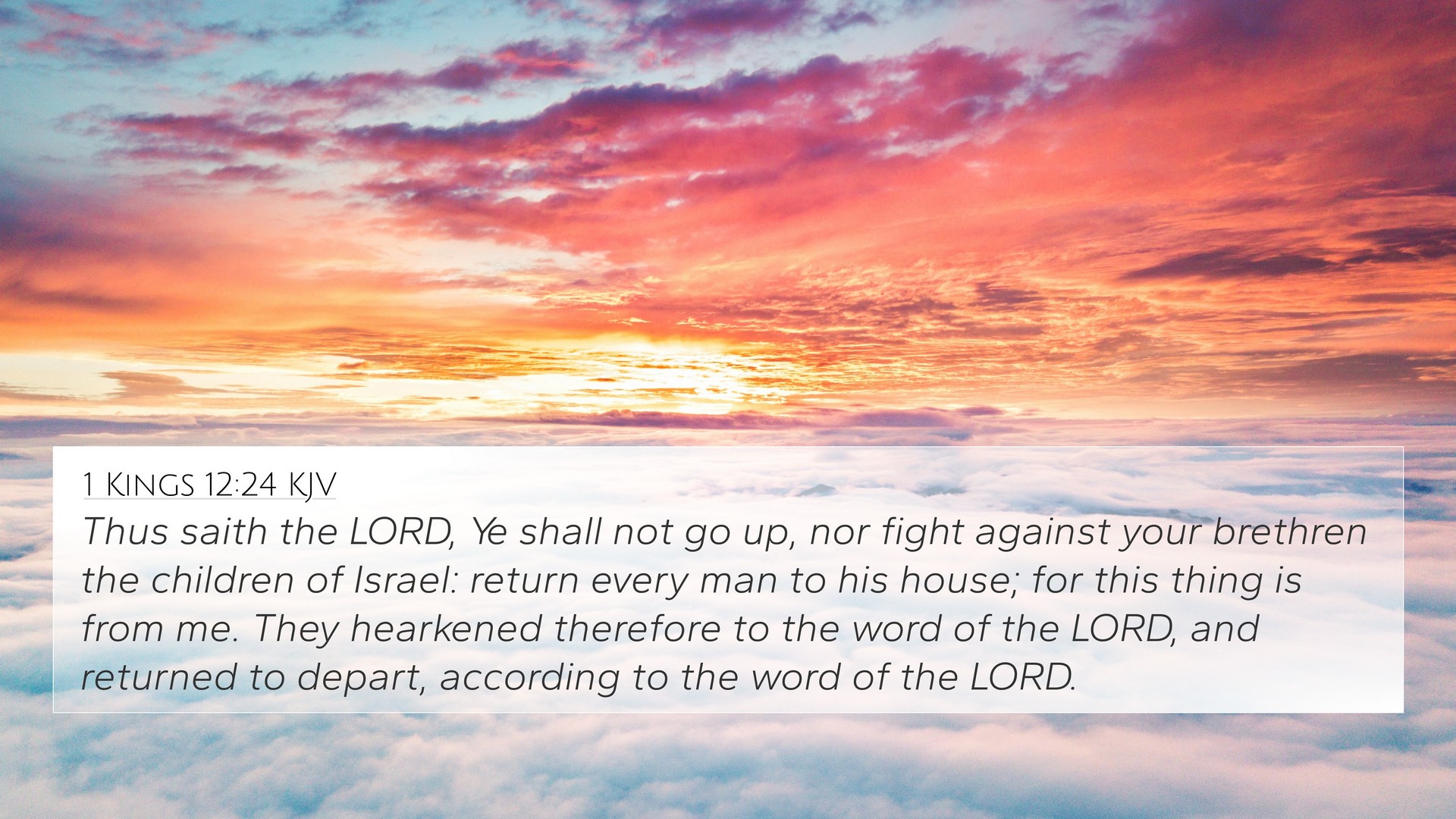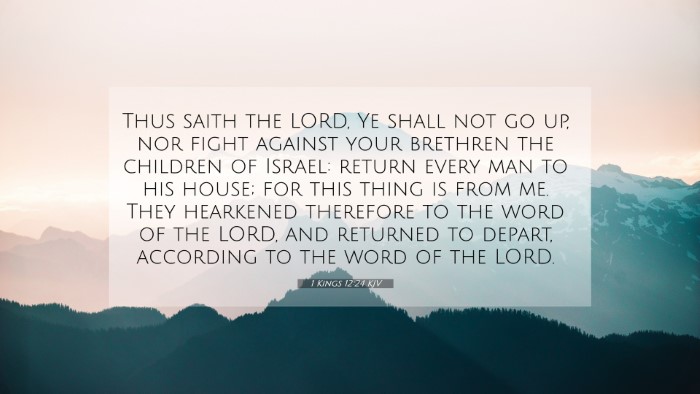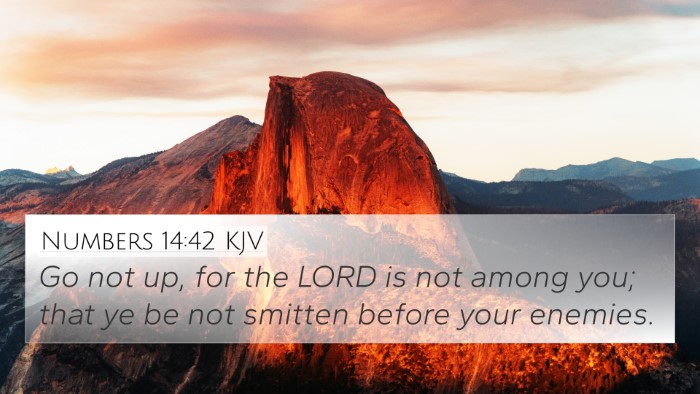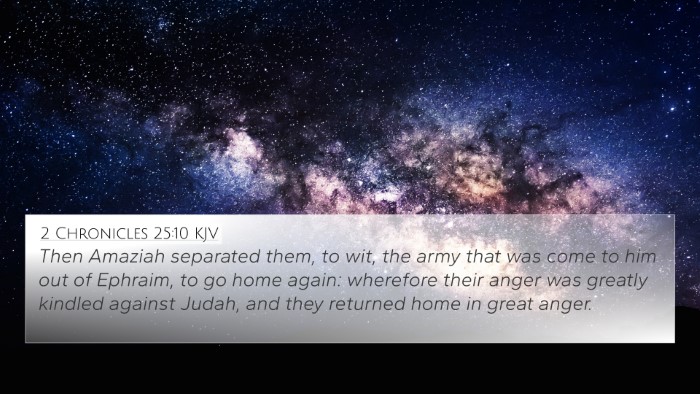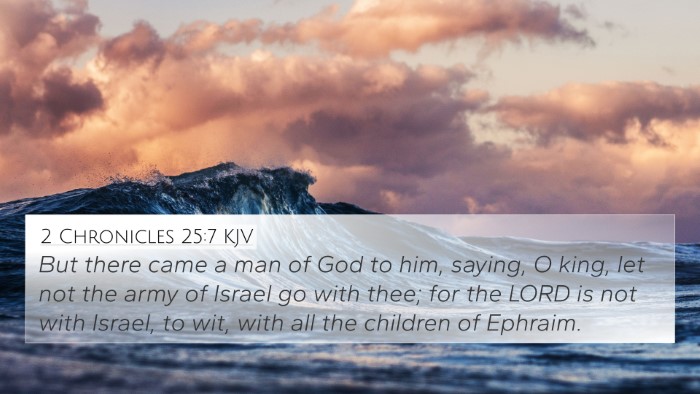Understanding 1 Kings 12:24
Verse: "Thus saith the LORD, Ye shall not go up, nor fight against your brethren the children of Israel: return every man to his house; for this thing is from me. They hearkened therefore to the word of the LORD, and returned to depart, according to the word of the LORD." (1 Kings 12:24 KJV)
Summary and Interpretation
The verse 1 Kings 12:24 comes at a pivotal moment in Israel’s history, following the division of the kingdom after Solomon's reign. Rehoboam, now king of Judah, faced hostility from the northern tribes, who sought to rebel against his rule. The context reveals God's intervention and His desire for peace.
Meaning and Insights from Commentaries
-
Matthew Henry:
Matthew Henry emphasizes the sovereignty of God in the unfolding events. He explains that God allowed the division to occur as part of His divine plan due to Solomon's unfaithfulness. The command to refrain from fighting reflects God's intent to prevent further conflict between the tribes of Israel.
-
Albert Barnes:
Albert Barnes highlights the obedience of the people to God's word. The verse illustrates how, despite their grievances and potential for civil war, the Israelites chose to return home, acknowledging God's authority. Barnes notes this as a moment of divine guidance amid turmoil.
-
Adam Clarke:
Adam Clarke provides a detailed examination of the societal implications. He posits that the direction to avoid conflict represents a call for unity and reconciliation. Clarke points out that this command indicates God's desire not just for peace but for the preservation of the covenant community.
Key Themes
- Divine Intervention: God speaks directly to avert war, showcasing His role in guiding human affairs.
- Obedience to God: The return of the people underlines the importance of listening to God's commandments, even in difficult circumstances.
- Peace over Division: The directive for the Israelites to return home signifies God's intention to foster harmony rather than hostility.
Cross-References
This verse can be cross-referenced with several other biblical passages that elaborate on its themes:
- 2 Chronicles 10:15: Discusses the providential aspect of the revolt and Rehoboam's rejection of wise counsel.
- 1 Kings 11:31: God's prophecy to Jeroboam concerning the division of the kingdom.
- Isaiah 19:2: God’s intervention in conflicts among His people.
- James 3:18: Emphasizes peace as a result of righteousness in community relations.
- Matthew 5:9: “Blessed are the peacemakers,” aligning with God's will for peace among His people.
- Romans 12:18: “If it be possible, as much as lieth in you, live peaceably with all men,” echoing the sentiment of avoiding conflict.
- Philippians 2:3-4: Encourages humility and valuing others above oneself, which is crucial for maintaining peace.
Thematic Bible Verse Connections
This verse exemplifies the overarching biblical themes of:
- God's Sovereignty: His control over nations and leaders.
- Obedience and Faith: How faithfulness to God’s word is crucial even in adversity.
- Unity and Reconciliation: A divine call for unity among believers.
Practical Applications
For contemporary readers, 1 Kings 12:24 encourages several key takeaways:
- Seeking Divine Guidance: Prioritizing prayer and seeking God’s direction in times of conflict.
- Emphasizing Peace: Choosing reconciliation and peace in personal and communal disputes.
- Understanding God's Will: Recognizing that sometimes what appears as a setback can be part of God's larger plan.
Conclusion
1 Kings 12:24 serves as a profound reminder of God’s control over human affairs and the importance of adhering to His guidance. It teaches believers to trust in divine providence, cultivate peace, and cherish the unity of the body of Christ. By employing tools for Bible cross-referencing and investigating the connections between Scriptures, believers can deepen their understanding and foster a greater sense of community.
